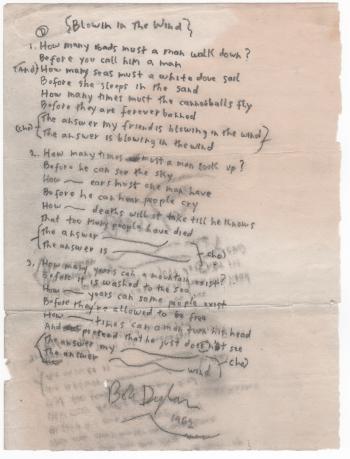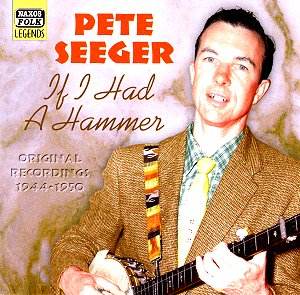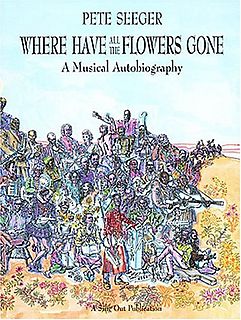Blowin' in the Wind

[1962]
Lyrics and music by Bob Dylan
Testo e musica di Bob Dylan
Album: The Freewheelin' Bob Dylan [1963]
Fu portata al successo da Peter, Paul and Mary, ma è una di quelle canzoni che, davvero, hanno cantato tutti. Compresa Joan Baez. E compreso, in una sua non memorabile interpretazione, Mino Reitano...
«In 1962, Dylan said of the song's background: "I still say that some of the biggest criminals are those that turn their heads away when they see wrong and they know it's wrong. I'm only 21 years old and I know that here's been too many wars...You people over 21 should know better." All that he prefers to add by way of commentary now is: "The first way to answer these questions in the song is by asking them. But lots of people have to first find the wind."»
(dalle note dell'album)
"Nel 1962, Dylan disse a commento della canzone "Dico ancora che alcuni dei più grandi criminali... (continua)
Lyrics and music by Bob Dylan
Testo e musica di Bob Dylan
Album: The Freewheelin' Bob Dylan [1963]
Fu portata al successo da Peter, Paul and Mary, ma è una di quelle canzoni che, davvero, hanno cantato tutti. Compresa Joan Baez. E compreso, in una sua non memorabile interpretazione, Mino Reitano...
«In 1962, Dylan said of the song's background: "I still say that some of the biggest criminals are those that turn their heads away when they see wrong and they know it's wrong. I'm only 21 years old and I know that here's been too many wars...You people over 21 should know better." All that he prefers to add by way of commentary now is: "The first way to answer these questions in the song is by asking them. But lots of people have to first find the wind."»
(dalle note dell'album)
"Nel 1962, Dylan disse a commento della canzone "Dico ancora che alcuni dei più grandi criminali... (continua)
How many roads must a man walk down
(continua)
(continua)
inviata da CCG/AWS Staff
If I Had A Hammer

[1949]
Testo di Lewis Hays
Musica di Pete Seeger
Lyrics by Lewis Hays
Music by Pete Seeger
If I Had A Hammer nasce nel 1949 come una canzone integrazionista, composta dal famoso cantautore folk Pete Seeger e incisa da Peter Paul & Mary. Il brano predica la tranquilla convivenza tra bianchi e neri, e per questo motivo parecchie stazioni nel sud degli USA si rifiutano di trasmetterla.
If I Had A Hammer
Produced by Tim Brachocki
If I Had A Hammer presents a sixty-year historical overview of significant struggles for increased democracy and social justice in the United States through the life and music of Pete Seeger. Interviews with Seeger and others involved in these various peoples' movements form the backbone of the program. Seeger's narrative ties the documentary together as he relates his life and music to the movements examined. The union, civil rights, peace, women's... (continua)
Testo di Lewis Hays
Musica di Pete Seeger
Lyrics by Lewis Hays
Music by Pete Seeger
If I Had A Hammer nasce nel 1949 come una canzone integrazionista, composta dal famoso cantautore folk Pete Seeger e incisa da Peter Paul & Mary. Il brano predica la tranquilla convivenza tra bianchi e neri, e per questo motivo parecchie stazioni nel sud degli USA si rifiutano di trasmetterla.
If I Had A Hammer
Produced by Tim Brachocki
If I Had A Hammer presents a sixty-year historical overview of significant struggles for increased democracy and social justice in the United States through the life and music of Pete Seeger. Interviews with Seeger and others involved in these various peoples' movements form the backbone of the program. Seeger's narrative ties the documentary together as he relates his life and music to the movements examined. The union, civil rights, peace, women's... (continua)
If I had a hammer
(continua)
(continua)
A Hard Rain's A-Gonna Fall

[1962]
Testo e musica di Bob Dylan
Words and music by Bob Dylan
Dall'album / From the LP "The Freewhelin' Bob Dylan" (1963)
Una delle più celebri canzoni contro la guerra, non solo di Bob Dylan ma in assoluto.
Scritta al tempo della crisi dei missili a Cuba nell'ottobre del 1962, secondo molti si riferisce al fall-out atomico, la caduta come pioggia delle scorie radioattive in seguito all'esplosione di una atomica. Probabilmente, però, come sottolineato dallo stesso Dylan in più di un'occasione, la canzone trascende questa semplice interpretazione pur confermandola, per assurgere ad un significato più universale e ricco di sottintesi biblici e cabalistici (come l'uso di numerazioni inusitate tipiche della Bibbia: "Ho inciampato sul fianco di dodici montagne nebbiose, ho camminato e strisciato su sei strade tortuose, ho camminato nel mezzo di sette tristi foreste, sono stato di fronte... (continua)
Testo e musica di Bob Dylan
Words and music by Bob Dylan
Dall'album / From the LP "The Freewhelin' Bob Dylan" (1963)
Una delle più celebri canzoni contro la guerra, non solo di Bob Dylan ma in assoluto.
Scritta al tempo della crisi dei missili a Cuba nell'ottobre del 1962, secondo molti si riferisce al fall-out atomico, la caduta come pioggia delle scorie radioattive in seguito all'esplosione di una atomica. Probabilmente, però, come sottolineato dallo stesso Dylan in più di un'occasione, la canzone trascende questa semplice interpretazione pur confermandola, per assurgere ad un significato più universale e ricco di sottintesi biblici e cabalistici (come l'uso di numerazioni inusitate tipiche della Bibbia: "Ho inciampato sul fianco di dodici montagne nebbiose, ho camminato e strisciato su sei strade tortuose, ho camminato nel mezzo di sette tristi foreste, sono stato di fronte... (continua)
Oh, where have you been, my blue-eyed son?
(continua)
(continua)
Where Have all the Flowers Gone

[1956]
Lyrics and music by Pete Seeger
to the tune of Drill Ye Tarriers Drill
Testo e musica di Pete Seeger
sull'aria di Trill Ye Tarriers Drill
Paroles et musique de Pete Seeger
sur la mélodie de Drill Ye Tarriers Drill
Verses 4 and 5 composed and added by Joe Hickerson
Le strofe 4 e 5 sono state composte e aggiunte da Joe Hickerson
Les couplets 4 et 5 ont été composés et ajoutés par Joe Hickerson
Italiano
English
Français
Il testo di questa, che è tra le più celebri canzoni contro la guerra di ogni tempo, è di Pete Seeger, anche se le versioni più note sono probabilmente quella cantata da Joan Baez in inglese e, soprattutto, Sagt mir wo die Blumen sind, la versione tedesca interpretata da Marlene Dietrich.
Secondo la sua stessa ammissione, Seeger si ispirò ad un brano del Placido Don dello scrittore russo Michajl Šolochov [Михайл Шoлoхoв] (che ottenne per quest'opera il... (continua)
Lyrics and music by Pete Seeger
to the tune of Drill Ye Tarriers Drill
Testo e musica di Pete Seeger
sull'aria di Trill Ye Tarriers Drill
Paroles et musique de Pete Seeger
sur la mélodie de Drill Ye Tarriers Drill
Verses 4 and 5 composed and added by Joe Hickerson
Le strofe 4 e 5 sono state composte e aggiunte da Joe Hickerson
Les couplets 4 et 5 ont été composés et ajoutés par Joe Hickerson
Italiano
English
Français
Il testo di questa, che è tra le più celebri canzoni contro la guerra di ogni tempo, è di Pete Seeger, anche se le versioni più note sono probabilmente quella cantata da Joan Baez in inglese e, soprattutto, Sagt mir wo die Blumen sind, la versione tedesca interpretata da Marlene Dietrich.
Secondo la sua stessa ammissione, Seeger si ispirò ad un brano del Placido Don dello scrittore russo Michajl Šolochov [Михайл Шoлoхoв] (che ottenne per quest'opera il... (continua)
Where have all the flowers gone,
(continua)
(continua)
×
![]()

[1982]
Lyrics and music by Judy Small
Testo e musica di Judy Small
"I wrote this song for my mother (though not all its details are true for her), and for all the women of her generation who, it seemed to me, spent a large part of their lives waiting for their menfolk to come home from war. They were the women whose work during World War II showed us that women could do any kind of job and were perfectly capable of independence. For that example, although they had little choice at the time, my generation is grateful to them and I hope we have learned the lesson well. This remains my favourite of all my songs." (Judy Small Songbook 53)
"Ho scritto questa canzone per mia madre (sebbene non tutti i particolari siano esatti a suo proposito), e per tutte le donne della sua generazione che, mi sembrava, hanno trascorso larga parte della loro... (continua)